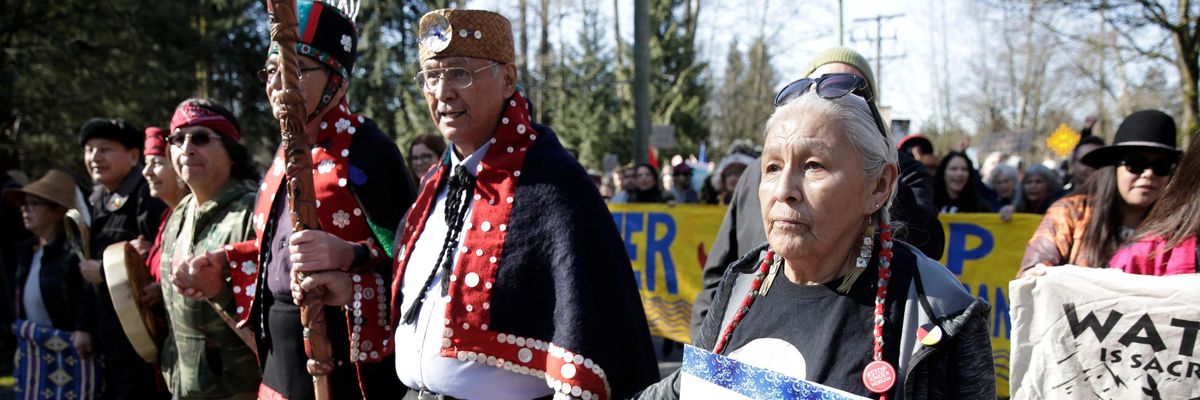This week, Hurricane Ida left over a million people without power, and shocking flooding is rocking the Northeast of the United States. More than 80 million Americans were under a flood watch or advisory, with the majority associated with Ida's heavy rains. Simultaneously, 43,400 Californians have been forced to flee their homes because of the deadly wildfires tearing across the region. Earlier this summer in Madagascar 400,000 people were headed for famine from severe drought. The climate crisis is here, and it is devastating, though communities are doing everything they can to care for one another in this time of overlapping crisis.
The climate and Indigenous rights movements are fighting back through incredible direct action, divestment, and land defense, and shaking the tar sands oil industry to its core.
While we are feeling the life shattering impacts of climate chaos every day, the oil barons are continuing to drive us off of a cliff- trying to increase export of tar sands oil through major pipeline construction and keep lining their pockets.
To understand the scale of the insurance industry's fossil fuel investment, according to the S& P Global the U.S. insurance industry had $582 billion invested in some combination of oil, gas, coal, utilities and other fossil fuel related activities.
The climate and Indigenous rights movements are fighting back through incredible direct action, divestment, and land defense, and shaking the tar sands oil industry to its core. This year, we have been incredibly successful at removing pillars of corporate support that are backing up these massive tar sands projects. A recent report from Indigenous Environmental Network and Oil Change international demonstrated that Indigenous resistance to destructive projects has stopped or delayed greenhouse gas pollution equivalent to at least one-quarter of annual U.S. and Canadian emissions.
Through creative organizing and campaigning, we are moving multi million dollar deals away from the hands of these oil executives. This is no small feat, considering that our movements are rarely --if ever--allowed in the room where these deals are made, and the government is regularly providing police, surveillance equipment, and unlimited budgets to the oil and gas industry.
Over the past year, a coalition of environmental and Indigenous rights groups has been spotlighting the insurers backing the Trans Mountain tar sands pipeline project, and we are reaching major milestones together. To date, fifteen insurers have ruled out Trans Mountain and more than ten have adopted tar sands exclusion policies. One company noted the pipeline no longer fits the company's "risk appetite."
The insurance industry offers hundreds of millions in coverage to the Trans Mountain tar sands pipeline, and in the beginning of this year the Canadian government granted Trans Mountain's request to keep their names secret. The company stated when seeking confidentiality that "Trans Mountain has already observed increasing reluctance from insurance companies to offer insurance coverage for the Pipeline and to do so at a reasonable price."
This argument conveniently ignores the issue of risk of insuring fossil fuels in an era of climate change, the already leaking 68 year old pipeline, and the increasing uncertainty of oil sand production. Coming to this issue of price--the pipeline is significantly delayed and costs must have risen substantially, and yet they continue to build with no public recourse at the taxpayer's expense. Estimates of the pipeline cost is $16 billion, that cost swelled higher than Canada's 2019 fiscal federal deficit.
Although the current insurers names are now hidden, we know from the old certificates who has been providing coverage for the project, and if they haven't ruled them out, we aren't letting up.
Lloyd's, the biggest insurance market in the world, has responded to pressure, and set a market-wide policy to stop new insurance cover for coal, oil sands and Arctic energy projects by January 2022.
But the dozens of Lloyd's insurers may still be filling the insurance certificate on Trans Mountain insurers, and many have not responded to requests to meet, or have given non-committal responses in regards to Trans Mountain.
Lloyd's of London syndicate members that may be insuring the project through the Lloyd's marketplace are:
- Apollo
- Arch
- Ark
- Beazley
- Brit
- Canopius
- CNA Hardy
- Hiscox
- Inigo
Our organizing has looked different every day. We have circulated petitions that reached over 150,000 signatures and coordinated a "Stop Insuring Trans Mountain" week of action with protests in 26 locations around the world, including countries across the ocean from Trans Mountain like Sierra Leone, Uganda, and Fiji. Grassroots communities have locked the office doors of these insurers closed, and held large ceremonies and resistance in their lobbies.
"Based on the coverages that you can get, I don't know if you'd see any more of these mega-projects go on in the oilsands anymore. I just don't see the ability to financially backstop some of the mega-projects that put the oil sands on the map," Joe Seeger, an advisor who has more than 25 years of experience advising oilpatch companies on insurance told CBC.
Today, over 20 Indigenous and Environmental organizations sent an open letter to the remaining insurers. "The insurance companies backing the Trans Mountain pipeline are intensifying the devastating impacts of the climate crisis and violating Indigenous Rights," said Grand Chief Stewart Phillip, President of the Union of British Columbia Indian Chiefs (UBCIC). "The Trans Mountain expansion and tanker project would enable a huge expansion of the world's dirtiest oil despite resistance from Indigenous Peoples along its route. The pipeline does not have the Free, Prior and Informed Consent of all Indigenous communities across whose lands this pipeline passes, and it will continue to face powerful resistance."
We will keep pushing this multi trillion dollar industry, and we need everyone to demand systemic change. The writing is on the wall for tar sands insurance, but we need a rapid unprecedented shift in this sector, and we can't do it without you.

